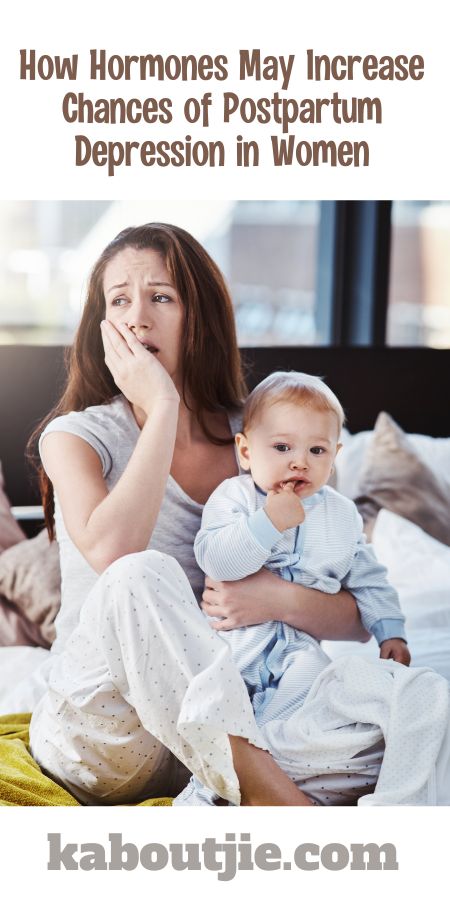Becoming a mother is a life-changing experience, marked by a mix of joy, excitement, and challenges. However, for some women, this transformative period can also bring about a less welcome guest – postpartum depression (PPD). While various factors contribute to the development of PPD, one area of research that has gained significant attention is the role of hormones. Hormones play a crucial role in regulating emotions and mood, and their fluctuation during pregnancy and the postpartum period can influence a woman’s susceptibility to PPD. In this blog post, we will delve into how hormones may increase the chances of postpartum depression in women.

The Hormonal Rollercoaster
Pregnancy and childbirth involve dramatic hormonal shifts. Throughout pregnancy, the body experiences a surge in hormones such as oestrogen and progesterone. These hormones help maintain the pregnancy and prepare the body for childbirth and breastfeeding. However, after childbirth, hormone levels drop abruptly, causing what is often referred to as the “postpartum hormonal crash.” This abrupt decrease in hormonal levels has the potential to trigger a variety of emotional and physical transformations. These encompass feelings of exhaustion, fluctuations in mood, and even sentiments of sorrow – all of these elements can act as early indicators for the onset of postpartum depression
Oestrogen And Serotonin Connection
Oestrogen, a key female sex hormone, plays a vital role in regulating mood and emotions. It affects the production, release, and reuptake of neurotransmitters, including serotonin – often referred to as the “feel-good” neurotransmitter. During pregnancy, the increase in oestrogen levels leads to higher serotonin levels, contributing to the generally positive emotional state experienced by many pregnant women. However, the subsequent decline in oestrogen levels postpartum can lead to a reduction in serotonin activity, potentially leading to feelings of sadness, irritability, and anxiety associated with PPD.

Cortisol And Stress
Another hormone that comes into play is cortisol, commonly known as the “stress hormone.” During pregnancy, cortisol levels rise to help the body adapt to the stressors associated with childbirth and motherhood. While cortisol is essential for managing stress, excessive or prolonged high cortisol levels can lead to negative effects on mood and mental well-being. Research suggests that the hormonal changes during pregnancy and the postpartum period can disrupt the normal regulation of cortisol, increasing the risk of mood disorders like postpartum depression.
Oxytocin And Social Bonding
Oxytocin, often referred to as the “love hormone” or “bonding hormone,” is released during childbirth and breastfeeding. It plays a vital role in promoting social bonding, attachment, and maternal behaviours. While oxytocin is generally associated with positive feelings, its effects can be more complex in the context of postpartum depression. Some research suggests that disruptions in oxytocin signalling may contribute to difficulties in forming strong emotional bonds with the baby, potentially exacerbating feelings of isolation and sadness in women with PPD.
How Women Can Fight PPD
Triumphing over postpartum depression (PPD) necessitates a multifaceted strategy that attends to the aspects of emotional, physical, and social welfare. While seeking professional help is essential, there are several proactive steps women can take to reduce the risk of PPD or manage its symptoms effectively. Here are some strategies:
- Build A Support System: Surround yourself with a supportive network of family, friends, and healthcare professionals who can offer understanding, assistance, and encouragement. Make sure to seek assistance if the need arises
- Prioritise Self-Care: Looking after your mental and physical health is vital. Maintain a well balanced diet, get enough sleep, and be physically active on a regular basis. Give precedence to endeavours that bring you happiness and relaxation
- Stay Connected: Avoid isolation by staying connected with loved ones and participating in social activities. Isolation can exacerbate feelings of sadness and loneliness, so reach out to others and engage in positive interactions.
- Mindfulness And Relaxation: Practicing mindfulness techniques, deep breathing, meditation, and yoga can help reduce stress and anxiety, promoting emotional well-being.
- Establish Realistic Expectations: Set realistic expectations for yourself as a new parent. Understand that perfection is not attainable, and it’s okay to ask for help or take breaks when needed.
- Open Communication: Maintain open and honest communication with your partner about your feelings and needs. Sharing your feelings and experiences can foster support and understanding.
- Seek Professional Help: In case you find yourself grappling with your emotions or harbouring suspicions of PPD, it’s advisable to seek guidance from a healthcare professional, whether it’s a therapist, psychiatrist, or medical doctor Early intervention makes can make a massive difference.
- Therapy And Counselling: Individual therapy or support groups specifically for new mothers can provide a safe space to discuss feelings and learn coping strategies. Cognitive-behavioural therapy (CBT) and other evidence-based therapies can be effective in managing PPD.
- Medication: In some cases, healthcare providers may recommend medication to address chemical imbalances contributing to PPD, which may include hormone replacement therapy. Consult your healthcare professional to determine if medication is an appropriate option for you.
- Bonding With Your Baby: Spend quality time bonding with your baby through skin-to-skin contact, cuddling, and gentle interactions. Building a strong connection can positively impact your emotional well-being.
- Limit Stressors: Reduce unnecessary stress by simplifying your daily routines and tasks. Delegate responsibilities and focus on what truly matters.
- Time For Yourself: Carve out moments for self-care, whether it’s reading, taking a bath, or pursuing a hobby. Allocating time for yourself can recharge your emotional batteries.
- Monitor Negative Self-Talk: Challenge negative thoughts and self-critical beliefs. Practice self-compassion and focus on your strengths as a parent.
- Reach Out for Help: If your symptoms worsen, you have a feeling of hopelessness or suicidal thoughts, get immediate assistance from a professional or call a helpline.
Conclusion
While hormones are just one piece of the complex puzzle that is postpartum depression, their influence on mood regulation and emotional well-being cannot be ignored. The hormonal rollercoaster experienced during pregnancy and the postpartum period can significantly impact a woman’s susceptibility to developing PPD. The interactions between oestrogen, serotonin, cortisol, and oxytocin highlight the intricate balance that must be maintained for optimal mental health during this crucial time. Through enhancing our understanding of the role hormones play in postpartum depression, we can formulate more precise strategies and support systems aimed at aiding women as they navigate the challenges of early motherhood Don’t forget, dads can sometimes feel the hormonal effects too!
 Kaboutjie SA Mommy Blogs by Lynne Huysamen
Kaboutjie SA Mommy Blogs by Lynne Huysamen




